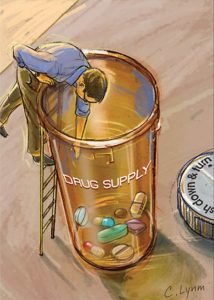By Deron Hamel
One of the greatest frustrations Epilepsy Ontario deals with during shortages of seizure-control medications is when impending drug shortages are identified but Health Canada and the provincial drug programs do nothing to try to prevent them, says Suzanne Nurse.
 Nurse, Epilepsy Ontario’s director of information and client services, says that 2016 has been one of the worst years, so far, for shortages of medications needed by people living with epilepsy since shortages began about five years ago.
Nurse, Epilepsy Ontario’s director of information and client services, says that 2016 has been one of the worst years, so far, for shortages of medications needed by people living with epilepsy since shortages began about five years ago.
Pharmaceutical companies have gone into shortage on multiple anti-seizure drugs. Lack of information about the shortages as well as lack of processes to prevent and manage them is putting people at risk as well as creating serious anxiety for people living with epilepsy and their families, she adds.
“There seems to be a failure to recognize how drug shortages evolve,” Nurse says. “We can see when a serious shortage is coming, one that will have an impact on people with epilepsy. We just can’t understand why (Health Canada and the provincial drug programs) that are overseeing the drug-shortage response can’t see it.
“We evaluate a couple of key factors: Are there only a few suppliers of a drug? Is the shortage expected to last a long time? Are the major suppliers affected? If the answers are ‘yes,’ ‘yes’ and ‘yes,’ then it’s pretty clear a serious problem is heading our way.”
Currently, there are significant shortages of two common anti-seizure medications in Canada: divalproex sodium and clobazam.
“We had to wait until we were in the middle of a crisis to get a response to the divalproex shortage. We’re still waiting to even get an acknowledgement of the seriousness of the clobazam shortage.”
Apotex Inc. first posted shortages of divalproex sodium on drugshortages.ca in June 2015; however, a collaborative effort to address the shortage did not begin until March 2016. The good news is that the response co-ordinated by Health Canada helped turn this around and generic formulations of divalproex sodium are beginning to recover, starting with the 500 mg strength tablets. It will take longer for the brand-name tablets, Epival, to recover.
Just as we’re starting to get out of the woods on divalproex, clobazam is now developing into a major problem. Apotex first reported a clobazam shortage in December. The drug was supposed to be restocked in mid-April, but about a month before the shortage was expected to end the date was pushed back to September. It has since been pushed back to Nov. 30. Pharmacies are now having trouble obtaining generic clobazam as well as the brand name tablets (Frisium).
Epilepsy Ontario wants to see a proactive response to anticipated drug shortages to prevent them from happening in order to reduce the impact on people living with epilepsy. With both the clobazam and divalproex sodium shortages, federal and provincial agencies were contacted to inform them of the impending shortages, but no proactive action was taken, Nurse says.
The drug shortages, coupled with the erratic changing of restock dates, are putting people’s safety at risk, Nurse says.
“Any shortages of medication that control seizures are of serious concern because epilepsy is a condition that you need to maintain good control of – missing a dose of a drug or changing medications, any kind of change like that can affect seizure control, so any drug shortage is a serious concern,” she says.
“The clobazam shortage is an even greater concern than most of the drug shortages that we deal with for epilepsy. There is no other drug like clobazam that can replace it when it is in shortage.”
Follow alerts on the Epilepsy Ontario website for updates on these drug shortages:
Divalproex sodium (Epival) alert
https://epilepsyontario.org/alert/alert-divalproex-sodium/
Clobazam (Frisium) alert
https://epilepsyontario.org/alert/alert-clobazam/
If you have feedback on this story, or have a story of your own that you would like to share, please contact the newsroom at 800-294-0051, ext. 23, or e-mail deron(at)axiomnews.com. You can also leave a comment below.







